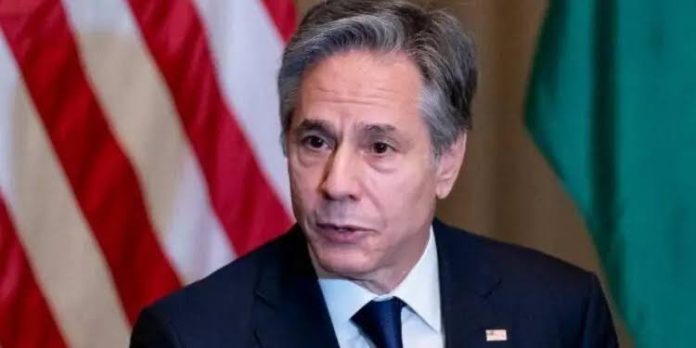- Family members of targets also affected
The United States of America government has threatened to impose visa restrictions on individuals found in action of undermining the Nigerian 2023 general elections.
The US Secretary of State, Antony Blinken, who disclosed this in a statement on Wednesday, said that the sanctioned individuals, whose name he did not reveal, would be ineligible for U.S. visas.
Blinken said that the action was in line with its commitment to supporting and advancing democracy in Nigeria and around the world.
The top-ranking diplomat explained that some family members of those barred from the U.S. may also be subjected to the same restriction.
“Today, I am announcing visa restrictions on specific individuals in Nigeria for undermining the democratic process in a recent Nigerian election.
“Under Section 212(a)(3)C) of the Immigration and Nationality Act, these individuals will be found ineligible for visas to the United States under a policy to restrict visas of those believed to be responsible for, or complicit in, undermining democracy in Nigeria.
“Certain family members of such persons may also be subject to these restrictions. Additional persons who undermine the democratic process in Nigeria—including in the lead-up to, during, and following Nigeria’s 2023 elections—may be found ineligible for U.S. visas under this policy.
“The visa restrictions announced today are specific to certain individuals and are not directed at the Nigerian people or the Government of Nigeria.
“The decision to impose visa restrictions reflects the commitment of the United States to support Nigerian aspirations to combat corruption and strengthen democracy and the rule of law,” he stated.
This is not the first time the U.S has placed such visa restrictions to deter people from disrupting the elections.
The development is coming barely two months after the political counselor at the US Embassy in Nigeria, Rolf Olson, said that the US would impose visa sanctions on people who try to undermine Nigeria’s democratic process.
Speaking at the Hubert Humphrey Fellowship alumni association seminar last November, Olson said sanctions had been placed on persons who undermined the nation’s election before and would be repeated in the next election.
He said, ‘’Even a small number of troublemakers can cause substantial havoc to an election. It takes a comprehensive effort to try to eliminate the use of violence and inflammatory rhetoric.
“Individuals seeking to undermine the democratic process, including through violence, may be found ineligible for visas to the United States. We have imposed visa restrictions in the past against those responsible for, or complicit in, undermining the democratic process, and remain fully willing to do so again in the context of the upcoming elections.”
Also, young Nigerians have registered in numbers to vote in crucial presidential elections taking place in 42 days in Africa’s most populous nation, a sign of intense youth interest in who leads the biggest democracy on the continent, data from the nation’s election body shows.
Nearly 40% of the 93.5 million Nigerians who registered to vote in next month’s presidential election are under 35 in the West African nation where the median age is 18, but the political class is largely made up of people two or three generations older.
Over 37 million voters are aged 18-34, including 7.2 million new voters, while another 33 million are aged 35-49, according to data released by the Independent National Electoral Commission.
“That is a bold statement by young citizens,” Cynthia Mbamalu, director of programs at the EU-backed nonprofit, YIAGA Africa, said from Abuja, the nation’s capital.
Anti-police brutality protests that swept the country in 2020 “were a wake-up call on the state of the nation and the need for youth participation in government,” she said.
The continent’s biggest economy will elect a new leader on February 25, replacing outgoing President Muhammadu Buhari, an 80-year-old former military dictator who got elected as a civilian president in 2015, and completes his second and final term in May.
Top contenders include Bola Ahmed Tinubu, the 70-year old leader of the ruling All Progressives Congress, former Vice President Atiku Abubakar, 76, of the opposition Peoples Democratic Party and ex-governor Peter Obi, 61, of the Labour Party.
Whoever emerges as Nigeria’s president will have to contend with stark economic deterioration, sticky inflation, rising debt service costs and insecurity.

